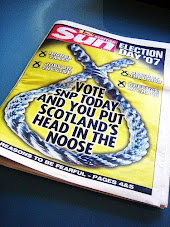All this talk of dates for the 2014 Referendum on Scottish Independence and the obligatory obfuscation that emanates from those opposed to the democratic mandate of the Scottish electorate, got me thinking about the importance of dates and how they might impact on Referendum voters.
We already know that the date which commemorates the 700th anniversary of Bannockburn takes place on the 24th of June that summer. It can be of scant regard to the anti-Independence parties to cite this as a date liable to inflame Scottish passions, given that the 1997 devolution referendum was held on the 11th of September, exactly 700 years to the day after that other great Scottish victory, the Battle of Stirling Bridge.
I like history, I didn't do particularly well at secondary school, I was more or less written off as not worth the effort by both teachers and my parents, well apart from one teacher Miss Gibson. She was a feisty gal, probably only in her late 20's-early 30's. She was handed the task of preparing a bunch of ill-mannered kids to pass their history 'O' Grade. She spoke about a Gaelic speaking Uncle from Lewis, who had been arrested and interred during the Great War, after being mistaken for a German spy. His only crime was to be in possession of sandy coloured hair and was discovered speaking with an unusual non-English accent. I liked Miss Gibson, I paid more attention in her classes and managed to retain enough of her lessons to scrape a pass in the O grade, not a particularly good mark, but good enough to help me find pleasure in reading and studying history.
I was confident enough to contribute to her class discussions on the Great War. An elderly Irish neighbour who had survived the trenches, would indulge me and tell me tales of the mundane things that happened to him amidst horror. One of my grandfather's had been blinded by German mustard gas, also known as Yperite. Relatives would describe Olympic class swearing from this long dead father of thirteen, who stumbled around a top floor Shawlands flat cursing every sharp object or small child his shins came into contact with. His injury and Miss Gibson came together for me, as she described the horror of modern warfare unleashed at Ypres in Autumn 1914. By the end of the year, she told us, some 90,000 of the original British Expeditionary Force were casualties, with an astonoshing 30% of them dead. Roughly 30,000 young men dead. The bulk of the victims during the first battle of Ypres, which saw modern warfare change from mobile infantry to static trench warfare, came from the Jocks and Taffs of the 1st Scots Guards, the 2nd Welsh Regiment and the 1st South Wales Borderers. The 2nd Worcester were there and suffered terribly, but somehow the disproportionate number of young Scotsmen who died at the time always stuck with me.
So, Autumn 2014, will find a referendum on Scottish Independence falling at some point, exactly 100 years after this epoch defining battle, that led to the deaths of thousands of Scots and the subsequent knock on effect of the depopulation of Scotland. Voting to ensure that my kids or grandkids or even great grandkids are never sent like lambs to the slaughter for a Monarch or a crusading Westminster zealot will be one of the considerations I think on, before voting Yes to Scottish Independence.









